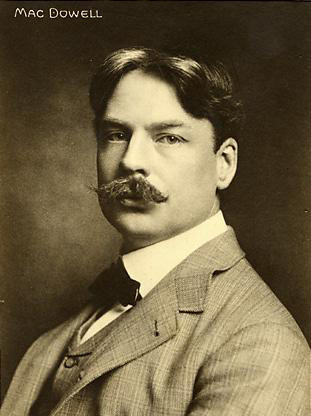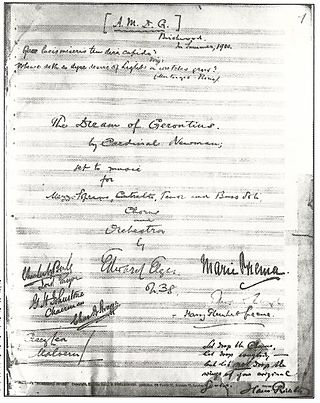Related Research Articles

Edward Alexander MacDowell was an American composer and pianist of the late Romantic period. He was best known for his second piano concerto and his piano suites Woodland Sketches, Sea Pieces and New England Idylls. Woodland Sketches includes his most popular short piece, "To a Wild Rose". In 1904 he was one of the first seven Americans honored by membership in the American Academy of Arts and Letters.

The Dream of Gerontius, Op. 38, is a work for voices and orchestra in two parts composed by Edward Elgar in 1900, to text from the poem by John Henry Newman. It relates the journey of a pious man's soul from his deathbed to his judgment before God and settling into Purgatory. Elgar disapproved of the use of the term "oratorio" for the work, though his wishes are not always followed. The piece is widely regarded as Elgar's finest choral work, and some consider it his masterpiece.

In the South (Alassio), Op. 50, is a concert overture composed by Edward Elgar during a family holiday in Italy in the winter of 1903 to 1904. He was working on a symphony, but the local atmosphere inspired him instead to write what some have seen as a tone poem, with an Italian flavour. At about 20 minutes' duration it was the composer's longest sustained orchestral piece to that time.
Ernest John Austin was an English composer, music arranger and editor. Although little-remembered today, Austin's orchestral music enjoyed some success in its own time, including performances at the Henry Wood Promenade Concerts and on BBC Radio during the 1920s. He was a prolific composer of songs, covering a wide spectrum of mood, from serious Shakespearean settings to ballads of both sentimental and robust natures. He found some success writing piano pieces and unison songs for children. He also made piano transcriptions of the work of other composers, a particularly common practice of the time.
"Pleading" is a poem written by Arthur L. Salmon, and set to music by the English composer Edward Elgar in 1908, as his Op.48.
Was it some Golden Star? is a poem written by Gilbert Parker, published in Volume I of a series of poems called Embers. It was set to music by the English composer Edward Elgar in 1910, as his Op. 59, No. 5.
Twilight is a song with music by the English composer Edward Elgar written in 1910 as his Op. 59, No. 6. Elgar set the words of the poem The Twilight of Love, from Volume 2 of a series of poems called Embers by Sir Gilbert Parker. The Opus 59 songs were part of a song-cycle of six romantic songs by Parker that was never completed – Nos 1, 2 and 4 were never composed. The other songs were Oh, soft was the song and Was it some Golden Star?. The songs were originally written with piano accompaniment, but this was later re-scored by the composer for full orchestra.
"A Child Asleep" is a song, with lyrics from a poem written by Elizabeth Barrett Browning. It was set to music by the English composer Edward Elgar in December 1909 and published in 1910 by Novello. It was first published by Browning in 1840.

In the Dawn is a song written by the English composer Edward Elgar in 1901 as his Op.41, No.1.

Speak, Music! is a song written by the English composer Edward Elgar in 1901 as his Op.41, No.2.
The River is a song written by the English composer Edward Elgar in 1909 as his Op.60, No.2.

"Come, Gentle Night!" is a poem by Clifton Bingham set to music by the English composer Edward Elgar in 1901.

"After" is a song written by the English composer Edward Elgar in 1895, as his Op. 31, No. 1, with the words from a poem by Philip Bourke Marston.
"The King’s Way" is a poem set to music by the English composer Edward Elgar in 1909. The words were written by his wife, Caroline Alice Elgar.

”Inside the Bar" is a song written in 1917 by the English composer Edward Elgar, with words by Sir Gilbert Parker.

The Fringes of the Fleet is a booklet written in 1915 by Rudyard Kipling (1865–1936). The booklet contains essays and poems about nautical subjects in World War I.

"In Moonlight" is a song with music written by the English composer Edward Elgar in 1904 to words from the poem "An Ariette for Music. To a Lady singing to her Accompaniment on the Guitar", by Percy Bysshe Shelley (1792-1822) and published in 1832.
Musical quotation is the practice of directly quoting another work in a new composition. The quotation may be from the same composer's work (self-referential), or from a different composer's work (appropriation).

Caroline Alice, Lady Elgar was an English author of verse and prose fiction, who married the composer Edward Elgar.
References
- ↑ Elgar to Speyer 15 December 1909
- ↑ Both works Op. 59 No. 3
- ↑ Elgar's friend August Jaeger died on 18 May 1909, and the music for the funeral was provided by Dr. Walford Davies. The organisation of a Memorial Concert took time, and that concert was not until eight months later.
- Kennedy, Michael, Portrait of Elgar (Oxford University Press, 1968) ISBN 0-19-315414-5
- Young, Percy M. (1973). Elgar O.M.: a study of a musician. London: Collins. OCLC 869820.
- Parker, Sir Gilbert, (1894) "Embers" Gutenberg Free Text